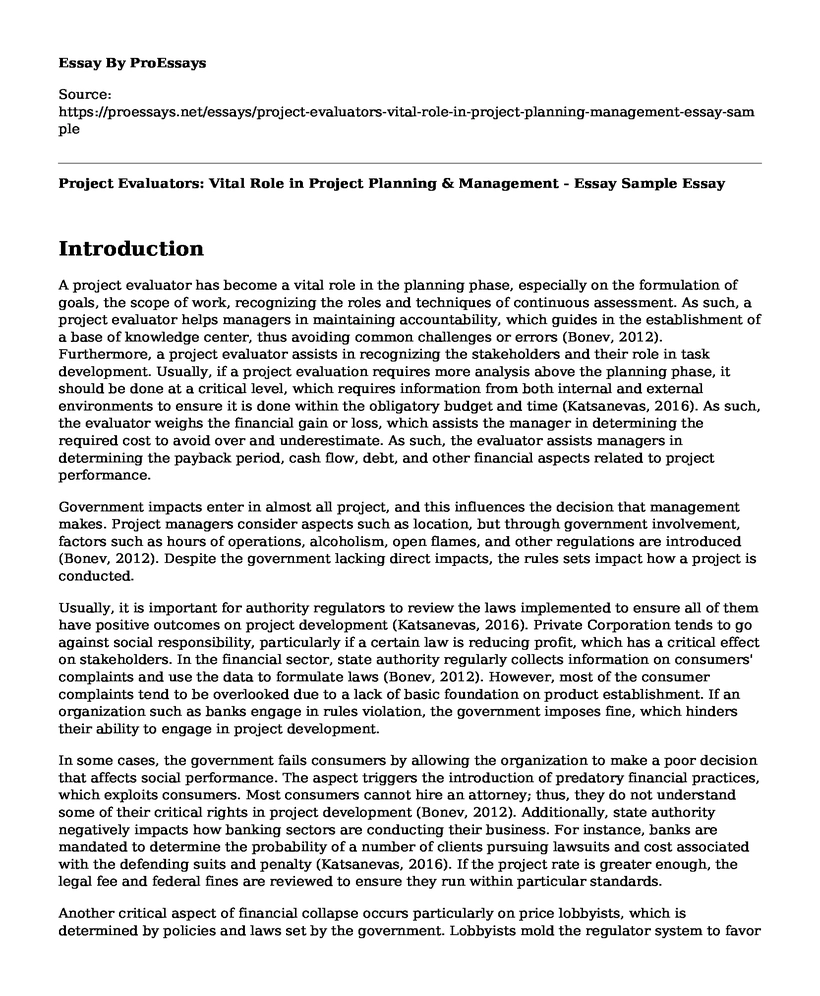Introduction
A project evaluator has become a vital role in the planning phase, especially on the formulation of goals, the scope of work, recognizing the roles and techniques of continuous assessment. As such, a project evaluator helps managers in maintaining accountability, which guides in the establishment of a base of knowledge center, thus avoiding common challenges or errors (Bonev, 2012). Furthermore, a project evaluator assists in recognizing the stakeholders and their role in task development. Usually, if a project evaluation requires more analysis above the planning phase, it should be done at a critical level, which requires information from both internal and external environments to ensure it is done within the obligatory budget and time (Katsanevas, 2016). As such, the evaluator weighs the financial gain or loss, which assists the manager in determining the required cost to avoid over and underestimate. As such, the evaluator assists managers in determining the payback period, cash flow, debt, and other financial aspects related to project performance.
Government impacts enter in almost all project, and this influences the decision that management makes. Project managers consider aspects such as location, but through government involvement, factors such as hours of operations, alcoholism, open flames, and other regulations are introduced (Bonev, 2012). Despite the government lacking direct impacts, the rules sets impact how a project is conducted.
Usually, it is important for authority regulators to review the laws implemented to ensure all of them have positive outcomes on project development (Katsanevas, 2016). Private Corporation tends to go against social responsibility, particularly if a certain law is reducing profit, which has a critical effect on stakeholders. In the financial sector, state authority regularly collects information on consumers' complaints and use the data to formulate laws (Bonev, 2012). However, most of the consumer complaints tend to be overlooked due to a lack of basic foundation on product establishment. If an organization such as banks engage in rules violation, the government imposes fine, which hinders their ability to engage in project development.
In some cases, the government fails consumers by allowing the organization to make a poor decision that affects social performance. The aspect triggers the introduction of predatory financial practices, which exploits consumers. Most consumers cannot hire an attorney; thus, they do not understand some of their critical rights in project development (Bonev, 2012). Additionally, state authority negatively impacts how banking sectors are conducting their business. For instance, banks are mandated to determine the probability of a number of clients pursuing lawsuits and cost associated with the defending suits and penalty (Katsanevas, 2016). If the project rate is greater enough, the legal fee and federal fines are reviewed to ensure they run within particular standards.
Another critical aspect of financial collapse occurs particularly on price lobbyists, which is determined by policies and laws set by the government. Lobbyists mold the regulator system to favor a particular organization in the expenses of the consumers (Bonev, 2012). For instance, thinking sensibly is a critical government approach that subjects pressure on a particular group that is interested in a product. Due to the lack of an effective system that regulates consumer abuses, most governments have experienced an economic breakdown.
When considering the options on how to approach a reverse logistic program, state authority impacts common aspects that are associated with the environment, health, and safety rules. It may be more cost-effective to outsource returns process instead of investing financial on controlling assets, development of infrastructure, purchasing materials to develop capabilities, which assist in regulating return in obedience to policies (Bonev, 2012). Government laws impact the design and construction of a return facility and how products are handled. Once processes are moving forward, the evaluator must frequently understand the chance to ensure they operate with the policies set by the government. However, it will be the role of project evaluator to establish ethical and socially helpful choice which will impact government policies.
References
Bonev, M. (2012). Managing reverse logistics using system dynamics: A generic end-to-end approach. Diplomica Verlag.
Katsanevas, T. (2016). Currency wars, recession policies and the overvalued Euro are to be blamed for the Modern Greek tragedy. International Journal of Economics & Business Administration (IJEBA), 4(1), 3-19. Retrieved from https://pdfs.semanticscholar.org/ccd7/77d9b25b45add9b834d4b0a909d267af4a56.pdf.
Cite this page
Project Evaluators: Vital Role in Project Planning & Management - Essay Sample. (2023, Apr 19). Retrieved from https://proessays.net/essays/project-evaluators-vital-role-in-project-planning-management-essay-sample
If you are the original author of this essay and no longer wish to have it published on the ProEssays website, please click below to request its removal:
- Research Paper Example: Lencrafter's Operational Management Strategies
- Report Example: The GMT Homes and Z-Tec Developments Project Management
- Honda Innovation and Change Essay Example
- Groupthink by Irving Janis Paper Example
- Essay Sample on Leadership Change Project Framework
- Marriott International Company Analysis Paper Example
- Essay Sample on Safety Risk Management: Identify, Evaluate, Analyze & Mitigate Risk







